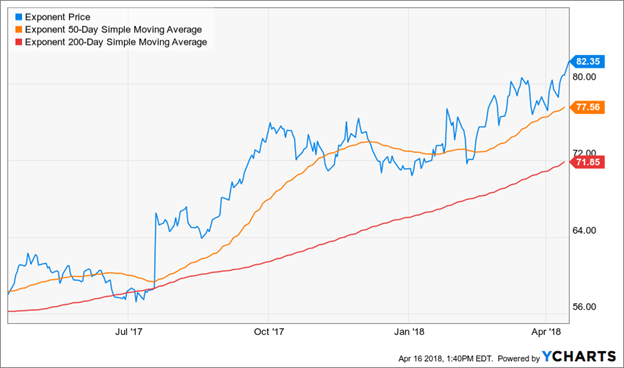Odds are, you don’t know Exponent Inc. (EXPO). That’s fine. You’re not supposed to, says Power Elite editor Jon Markman.
The Silicon Valley company does not make cool products. Rather, it determines why those products fail, and how to stop failure from happening in the future.
And there’s big demand for its work. Shares of the scientific and engineering consulting company reached a record high Friday, April 20 of $85.85.
In fact, in this era of drastically reduced production cycles, the business is better than ever before.

Exponent shares hit an all-time high last week, and continue to climb
Almost every week, I write about the exponential progression of information technology. It’s a mouthful.
The big idea is that knowledge is advancing so quickly, products that used to take years to develop are coming to market in months.
It is a double-edged sword. Today’s things — buildings, vehicles and consumer products — push the boundaries of material sciences.
Occasionally, they fail. Sometimes spectacularly so.
Many companies don’t fully recover from failure. The others — a smaller, rarer few — come back bigger, better and stronger than ever.
Exponent did even better. It built a business that makes a lot of money from fixing other companies’ messes … and preventing new ones.
For Exponent, failure really is the best option.
Silicon Valley-based Exponent began in 1967, as Failure Analysis Associates. A group of academics, led by Allan Stephen Tetelman, a Stanford University professor, raised $500 million. They wanted to start a niche consulting business to determine why products fail.
In 1973, Tetelman, William D. Nix and Craig Barrett coauthored the textbook “The Principles and Engineering Materials.” It shaped the business.
By the time Tetelman died in a plane crash in 1978, the company had become world-renowned for its expertise. It provided unparalleled research and investigative analysis to some of the biggest players in manufacturing, energy, health, insurance and consumer products.
Through the years, the Exponent case log has crisscrossed sectors and controversies …
From the Oklahoma City bombing … the Space Shuttle Columbia and Challenger disasters … and the collapse of the World Trade Center … to the Samsung battery explosions and several high-profile construction, airline and vehicle failures, Exponent has played a key role in solving mysteries large and small.
When the NFL worried that deflated footballs might have helped the New England Patriots reach the Super Bowl in 2015, the league called Exponent for analysis.
Exponent managers put the company in a self-fulfilling loop.
• It wins high-profile work because it has the best people.
• And it’s able to attract the best people because it wins high-profile work.
The company is best-in-class. This is a key competitive advantage.
Building advantages is what great businesses do. Managers instinctively leverage company strengths to maintain profit margins. This allows them the leeway to take-on challenges as they arise, and to build new revenue streams.
For example, Samsung selected Exponent to determine why the batteries in its Galaxy Note smartphones were exploding. After the initial systems failure analysis was complete, Samsung contracted Exponent for new lithium-ion battery research.
This is an opportunity Exponent is eager to exploit.
And not just with Samsung …
Very often, the company is being asked to stay on in a proactive role. This is a new source of business, and it plays into the company’s core strength to attract the best and the brightest.
As a result, Exponent is increasing headcount, particularly in Hong Kong and other parts of Asia.
And it is doing so profitably …
During the fourth-quarter financials conference call Feb. 1, CEO Paul Johnston noted that headcount grew 7% during 2017, thanks to strong demand for its services. Annual revenues increased 10%, to $347.8 million. More important, operating margins expanded 165 basis points, to 26.5%.
Leveraging strengths to find new revenue streams is not especially innovative. It seems like common sense. But not many companies are capable of pulling it off.
The founder of Exponent literally wrote the book on engineering materials. Since then, the company has been leveraging its collective reputation to consistently grow the business in new and exciting ways.
The business has been exceptional for shareholders. According to Morningstar, the 15-year average annual rate of return is 24.2%. A modest investment of $10,000 then, would be worth $252,121 today.
And the best may be yet to come …
Exponent is a key player in vehicle safety. Just imagine the scope of new research required as cars move from driver-assisted systems like Tesla’s Autopilot or Toyota’s Guardian Angel, to full autonomous systems.
Related story: Tesla Rides to the Rescue of Bad Drivers
Finding well-managed, niche companies like Exponent is the core of what I do for my Power Elite members.
Very often, the best investments are not the ones being touted on TV or bantered about at cocktail parties.
They are not hot tips. They don’t have celebrity managers.
They are focused companies that manage small, regardless of their size. They stick to their knitting. They leverage the things they do well to grow sales. Even then, they will only grow if they can make money at it.
Exponent is a company making new highs. You probably don’t know anything about it. And that is fine. You’re not supposed to.
Best wishes,
Jon D. Markman
P.S. I make it my business to help my subscribers invest in companies like Exponent. Sign up to get my timely buy and sell signals delivered straight to your inbox — just click here.
Subscribe to Jon Markman’s Power Elite newsletter here
Subscribe to Jon Markman’s Tech Trend Trader here
Subscribe to Jon Markman’s Strategic Advantage here





















